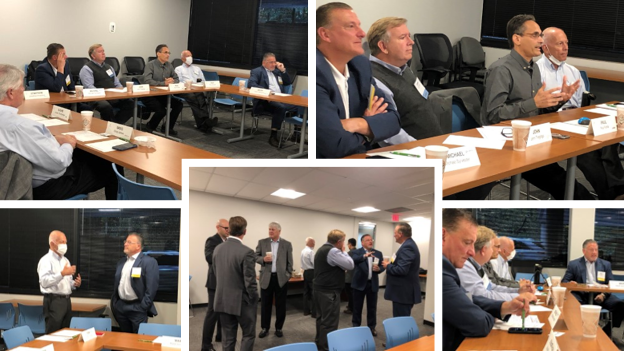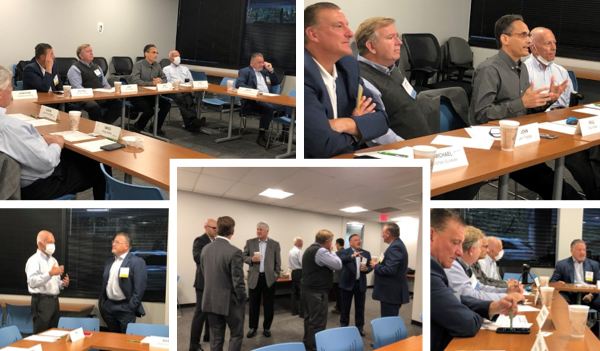Key Take Aways from Northern New Jersey’s May 2023 Meeting
• Continue to be busy, especially in the planning group. There are opportunities in land use and civil engineering. (Charles Heydt – Dresdner Robin)
• Land is scarce and with the regulatory environment in the state, it’s even more scarce. But there are opportunities, and developers need to be more creative. (Charles Heydt – Dresdner Robin)
• Municipalities have been working to restrict warehouse projects. (Charles Heydt – Dresdner Robin)
• The market is still uncertain and they are diversifying into transportation. (Charles Heydt – Dresdner Robin)
• Environmental Justice is recognizing overburdened communities. New piece of legislation in NJ will notify municipalities that are overburdened communities and require them to make it a priority, with 120 days to respond. (Charles Heydt – Dresdner Robin)
• Interest rates continue to be an issue with markets focusing on the Fed. Many had been expecting a 50% chance of a rate hike in June, but that has changed. (Gregory James – NAI James E. Hanson Inc)
• Can currently buy a 6 month treasury bill for 5% or a bank CD for 5.25%. Banks are competing for funds. (Gregory James – NAI James E. Hanson Inc)
• There is a credit crunch of epic proportions going on right now in commercial real estate. Banks won’t say they’re not lending, but they’re making it difficult. (Gregory James – NAI James E. Hanson Inc)
• There is uncertainty regarding the suburban office market. Many will have a difficult time refinancing large loans. Banks were cautious about suburban office 10 years ago. (Gregory James – NAI James E. Hanson Inc)
• Land in NNJ is worth a lot on its own. Lenders may not be as compromised in the suburban areas vs urban areas. (Gregory James – NAI James E. Hanson Inc)
• Industrial as an asset will be much more valuable and an industrial shortage is expected. People are affected on a daily basis by supply chain issues. (Gregory James – NAI James E. Hanson Inc, Charles Heydt – Dresdner Robin)
• There are bigger issues with industrial development in areas along the turnpike that are more rural where municipalities and citizens are resistant to change. (Bill Hanson – NAI James E. Hanson Inc)
• Planning boards are denying land use applications even though it’s a permitted use and municipalities are challenging developers. The longer the municipality delays, the larger the chance that the developer walks away. People are fighting changing the fabric of their community, along with concerns about traffic issues, particularly large trucks. (Matthew Posada – Sills Cummis & Gross)
• Industrial traffic is actually less traffic than the fully occupied office building which it is being repurposed from. (Bill Hanson – NAI James E. Hanson Inc)
• Industrial is a windfall for municipalities with less burden on schools and very few employees, but representatives may not be thinking things through when opposing development. (Matthew Posada – Sills Cummis & Gross, John Tregidgo – Dresdner Robin)
• School populations are down from 10 years ago but districts aren’t reducing the number of teachers or administrators and are in fact expanding. (Bill Hanson – NAI James E. Hanson Inc)
• Many businesses are leaving, in part because of the regulatory environment of the state. (Matthew Posada – Sills Cummis & Gross)
• Citizens often associate tax abatements with developers getting rich off the taxpayers, but the truth is the municipalities get new funding to spend however they want. It’s the counties who lose out. (Matthew Posada – Sills Cummis & Gross)
• There is a new movie studio project in Bayonne. Bayonne has a new director of economic development who is willing to work with developers. (Matthew Posada – Sills Cummis & Gross, Charles Heydt – Dresdner Robin)
• Many municipalities are skirting affordable housing requirements and have been successful at avoiding it, despite builder’s remedy lawsuits. (Matthew Posada – Sills Cummis & Gross)
• This is the 4th straight year of negative office market absorption in NJ, which is worse than the national average. (Mateusz Wnek – CoStar Group)
• Retail growth in NJ has been slower compared to the national average but has been improving in late 2022 and 2023. They are not sure what’s driving the recent growth. (Mateusz Wnek – CoStar Group)
• There is a tidal wave of mulit-family supply coming. (Mateusz Wnek – CoStar Group)
• Industrial has been weaker this year than compared with Q4 of 2022, with occupiers becoming more selective. Lots of supply coming online. (Mateusz Wnek – CoStar Group)
• Investment side of the business has slowed down, but the commercial & industrial side has not. The Pennsylvania market (with South Jersey) has been doing really well within the last year. (Diane Leva – Columbia Bank)
• They are still lending, despite the high rates. (Diane Leva – Columbia Bank)
• Some businesses have had trouble meeting their covenants due to rising interest rates. Many had been using PPP and similar funds in past years. Some clients need to take more drastic measures. (Diane Leva – Columbia Bank)
• IntraFi helps customers maintain FDIC coverage on larger amounts of money. (Diane Leva – Columbia Bank)
• Environments have changed. Warehouse is still very active, but not as hot as 9 months ago. There is movement in the office arena, with plenty of consolidation moves. Retail is not bad, depending on your location, with a larger focus on experiences. (Bill Hanson – NAI James E. Hanson Inc)
• Seeing redevelopment of some older office buildings. (Bill Hanson – NAI James E. Hanson Inc)
• Very active in the Philadelphia area. (Marshall Berman – Kenilworth Capital Advisors)
• Downturns can be a great opportunity to call up old contacts. (Marshall Berman – Kenilworth Capital Advisors)
• There is an issue with fake lenders, where the “lender” you’re dealing with isn’t actually doing the lending. (Marshall Berman – Kenilworth Capital Advisors)
• 6-8% isn’t that bad when compared with the early 80s. (Marshall Berman – Kenilworth Capital Advisors)
• There has been more public sector work than before due to the infrastructure bill. (John Tregidgo – Dresdner Robin)
• As employers, there is a duty to keep employee data secure. (Paul Hacker – Axis Insurance Systems)
• A hacker often gets into the system when one employee opens a document from an email that contains malware. (Paul Hacker – Axis Insurance Systems)
• The dark web originally was formed by the government, but hackers and criminals have taken control of that to sell data. (Paul Hacker – Axis Insurance Systems)
• The most expensive data sold is medical records. (Paul Hacker – Axis Insurance Systems)
• Hackers can also get into a secure network by using a flash drive with code on it. (Charles Heydt – Dresdner Robin)
• Ransomware is when the hacker locks you out of your own system. Average ransom is $1-3 million and ransoms are paid in bitcoin. (Paul Hacker – Axis Insurance Systems)
• Because of Covid, more people working from home and networks were wide open. (Paul Hacker – Axis Insurance Systems)
• There were lots of cheap cyber insurance policies that were sold before Covid, so renewals were much more expensive with premiums increasing by large amounts for lesser coverage. (Paul Hacker – Axis Insurance Systems)
• Cyber insurance rates are coming down as carriers are offering training and requiring compliance with security policies. (Paul Hacker – Axis Insurance Systems)
• There is lots of wire fraud and fund transfers when hackers trick employees with authentic looking emails. (Paul Hacker – Axis Insurance Systems)
• It’s important to have a separate cyber insurance policy, not a small piece of a larger policy. (Paul Hacker – Axis Insurance Systems)
• One of the key things to prevent attacks is to educate employees. Not just once per year, but often and with IT departments testing employees. (Paul Hacker – Axis Insurance Systems)
• Hackers can now get into systems without files. (Paul Hacker – Axis Insurance Systems)
• Healthcare gets hit the hardest, with banking and manufacturing coming in second and third. (Paul Hacker – Axis Insurance Systems)
• You cannot get insurance today without having security protocols in place. (Paul Hacker – Axis Insurance Systems)
• The three most basic things to have in place to protect against attacks are multi-factor authentication, endpoint detection and response, and encryption. (Paul Hacker – Axis Insurance Systems)
• Cyber insurance usually includes a business interruption clause. (Paul Hacker – Axis Insurance Systems)






Recent Comments